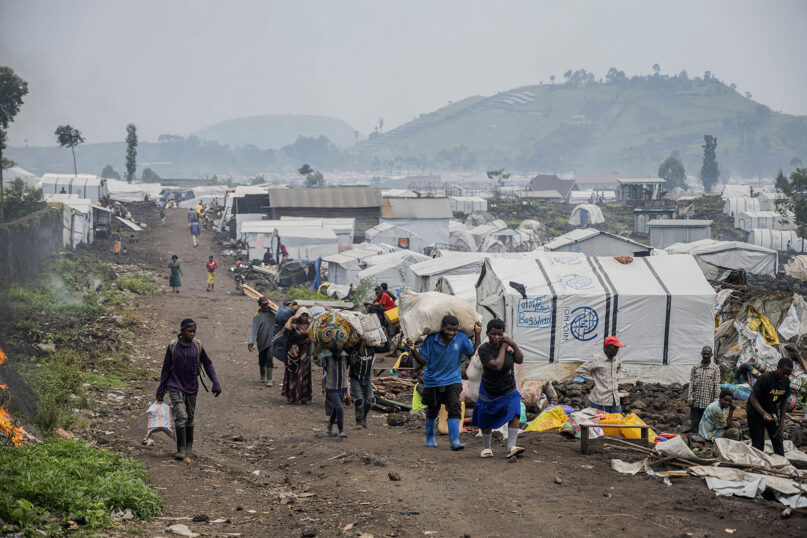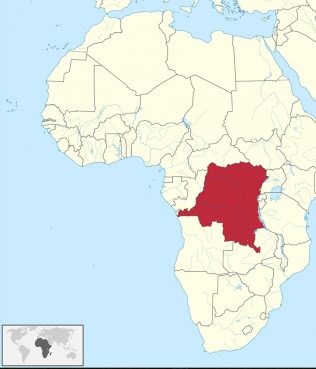GOMA, Democratic Republic of the Congo (RNS) — Pastor Allan Ngwaba has been offering daily counseling sessions, both in churches and homes, to people affected by the violent conflict in the Congo.
The professional counselor and pastor at Rivers Pentecostal Church in Goma said many civilians he has met with are experiencing severe post-traumatic stress disorder since the violence and killings in the country escalated earlier this year. Their suffering, he said, is often a result of losing multiple loved ones, exposure to horrific images, witnessing human cruelty, the constant threat of death and a lack of basic necessities such as food and shelter.
“You need to listen to them during counseling sessions as they express their anger and cry uncontrollably about what has happened to them,” Ngwaba said. “Once they have been able to express themselves, you can begin discussing how to accept their situation, understand why the conflict occurred and explore the best ways to move forward and overcome their circumstances.”
The enduring conflict in Eastern Congo, which has devastated the region for decades, is rooted in the aftermath of Rwanda’s 1994 genocide and the fierce competition for control over the nation’s mineral resources. The minerals are used for manufacturing batteries that power electric vehicles and other electronics.
Starting in January, the March 23 Movement known as M23, which is a Tutsi armed rebel group, began a new offensive against Congo government armies. M23 has gained control of new areas, including Eastern Congo’s two largest cities, Goma and Bukavu, along with several smaller localities.
The Congolese government said the ongoing fighting has killed at least 7,000 people since January. About 7.3 million are estimated to be displaced within the country — an all-time high — and 86,000 have fled to nearby countries, according to the United Nations Refugee Agency.

People who were displaced by the fighting between M23 rebels and government soldiers leave their camp after an instruction by M23 rebels in Goma, Congo, Feb. 11, 2025. (AP Photo/Moses Sawasawa)
According to the UN, M23 is supported by up to 4,000 Rwandan troops. However, Rwanda denies that claim, saying its forces are in the region to defend against threats posed by the Congolese army and hostile militias.
Amid the violence, Ngwaba is among many local Christian leaders who are increasing their efforts to provide psychosocial support to those affected.
“These sessions are designed to heal the emotional and social wounds caused by armed conflict,” he said. “They aim to discourage victims from succumbing to depression, contemplating suicide or losing hope,” emphasizing that psychological care is closely linked with physiotherapy.
His congregation and others in the area are also holding regular gatherings to pray for peace. Hundreds of Christians come to the daily gatherings in many areas of Eastern Congo.

The Democratic Republic of the Congo in central Africa. (Map courtesy Wikimedia/Creative Commons)
“Our only hope is prayer because rebel soldiers are everywhere, and everyone is threatened by their presence,” said Grace Nsimba after leading a prayer session.
Nsimba, a 35-year-old mother of three, lost her husband and a brother during a fight between the Congolese army and M23 on Jan. 27, during the takeover of Goma.
“People are devastated and dying because of this war. What we need now is peace, and this can only be achieved through prayers,” she said. “We are praying for our lives and for those who have lost loved ones, those suffering because of the war and those who are traumatized by the horrifying things they have witnessed. We pray for an end to the conflict, hoping that the warring parties will stop the violence and save millions from death and suffering.”
In Bukavu, residents have been gathering for interfaith services to pray for peace following the capture of the city by M23 in mid-February.
Monsignor Floribert Bashimbe, vicar general of the Archdiocese of Bukavu, said the interfaith services, led by local religious leaders and officials, aim to unite the community, pray for an end to the conflict, uplift each other spiritually and address critical humanitarian needs in areas where daily struggles for basic necessities are impacting residents, although the city did not see as much heavy fighting as Goma did.
“We have come together in prayer, asking God to grant our leaders the wisdom, strength and humility to make sound decisions that will reduce loss of life and alleviate the suffering of the people, ultimately leading to security in the region,” Bashimbe said.
Bashimbe also urged young people and fighting factions to cease destroying property, including looting and burning houses, schools, government buildings and health centers. He encouraged trained counselors and religious leaders to assist those recovering from traumatic experiences and noted the importance of helping people rebuild their lives.
Some religious leaders have also engaged with rebels to attempt to facilitate a peace agreement. In February, Monsignor Donatien Nshole, the secretary general of the Bishops’ Conference of the DRC, was involved in such discussions. He said M23 leaders told his delegation they were not seeking to divide the country and were not involved in the illegal exploitation of resources.
M23 has claimed its goal is to protect ethnic Tutsis in Congo, who have suffered from the long-standing tensions between Hutus and Tutsis that culminated in the 1994 Rwanda genocide, during which more than 800,000 Tutsis and others were killed. The rebel group has also vowed to advance to the capital of Congo, Kinshasa, to overthrow the government.
During the meeting, the religious leaders urged the rebels to reopen infrastructure, like the airport and port, to facilitate the delivery of humanitarian supplies, he said.
“We still believe that the solution to this crisis is not military,” Nshole, a Catholic priest and political figure, said after the meeting.
However, residents are growing increasingly desperate for a resolution, grappling with the daily fear and uncertainty of life as rebels continue to advance.
“The longer these leaders remain in disagreement, the more lives are lost and suffering continues,” Nsimba said. “We must amplify our prayers for these leaders to come together and reach an agreement to end the conflict, so we can finally reclaim our peace.”